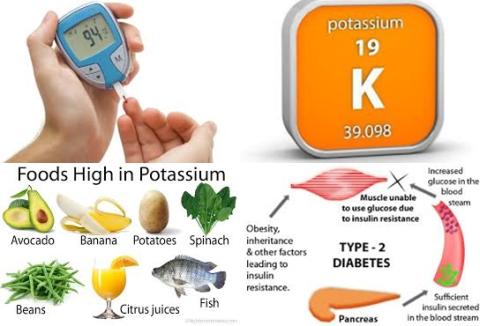
Objectives:
What is the relationship between serum, dietary and urinary potassium and the risk of type 2 diabetes mellitus (T2DM)?
Study design:
This review article included 8 prospective cohort studies involved 5,053 type 2 diabetes mellitus cases among 119,993 individuals.
The follow-up durations were from 5 to 18.1 years with a baseline age range from 18 to 95 years.
Serum potassium was measured using the ion-selective electrode method. Dietary potassium was estimated from food frequency questionnaire (FFQ). Urinary potassium samples were analyzed by potentiometric methods.
Most of the included studies provided risk estimates adjusted for age, sex, race, BMI and family history of diabetes.
Results and conclusions:
The investigators found in 5 studies involving 28,944 individuals and 3,849 type 2 diabetes mellitus cases, a non-significantly reduced risk of 21% [summary RR = 0.79, 95% CI = 0.60-1.04, I2 = 76.7%] for type 2 diabetes mellitus, when comparing the highest versus lowest serum potassium levels.
However, the sensitivity analysis did show a significant inverse association between serum potassium and type 2 diabetes mellitus risk [RR = 0.63, 95% CI = 0.52-0.73, I2 = 0%].
The investigators found in random dose-response meta-regression analysis a significantly reduced risk of 17% for type 2 diabetes mellitus [RR = 0.83, 95% CI = 0.73-0.95] per 1 mmol/L increase in serum potassium.
The investigators found in 6 studies involving 112,125 individuals and 4,573 type 2 diabetes mellitus cases, a non-significantly reduced risk of 7% [RR = 0.93, 95% CI = 0.81-1.06, I2 = 0.0%, p = 0.52] for type 2 diabetes mellitus, when comparing the highest versus lowest dietary potassium intake.
The sensitivity analysis did not significantly alter the association between dietary potassium and type 2 diabetes mellitus risk.
The investigators found there was no significant dose-response relationship between dietary potassium and type 2 diabetes mellitus risk [RR for every 1000mg increase dietary potassium per day = 1.00, 95% CI = 0.96-1.05].
The investigators found in 3 studies involving 4,376 individuals and 455 type 2 diabetes mellitus cases, a non-significantly reduced risk of 17% [RR = 0.83, 95% CI = 0.39-1.75, I2 = 73.9%, p = 0.02] for type 2 diabetes mellitus, when comparing the highest versus lowest urinary potassium levels.
The investigators found there was no significant dose-response relationship between urinary potassium levels and type 2 diabetes mellitus risk [RR for 10 mmol increase in urinary potassium per 24 hours = 1.00, 95% CI = 0.95-1.05].
The investigators concluded that serum potassium levels are linearly associated with the risk of type 2 diabetes mellitus, with each 1 mmol/L increase in serum potassium lowering the risk by 17%. However, neither dietary potassium nor urinary potassium shows any association with the risk of type 2 diabetes mellitus.
Original title:
Potassium measurements and risk of type 2 diabetes: a dose-response meta-analysis of prospective cohort studies by Peng Y, Zhong GC, […], Yang G.
Link:
https://www.ncbi.nlm.nih.gov/pmc/articles/PMC5725047/
Additional information of El Mondo:
Find more information/studies on type 2 diabetes and potassium right here.